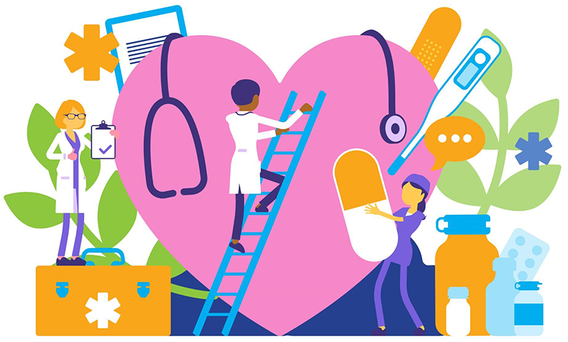
Interprofessional Collaboration’s Effect on an Individual's Wellbeing
Resiliency: measure of the ability to cope with stress and thrive when faced with adversity
Stress: a state of mental or emotional strain or tension resulting from adverse or very demanding circumstances
Burnout: workers reactions to the chronic stress common in occupations involving numerous direct interactions with people-emotional exhaustion, depersonalization, and a sense of low personal accomplishment that leads to decreased effectiveness at work
Wellbeing: a state of balance or alignment in body, mind, and spirit. (In this state, we feel content; connected to purpose, people and community; peaceful and energized; resilient and safe).
**This blog does not provide medical advice, but ideas to help achieve wellbeing**
Background

Wellbeing and stress are topics frequently discussed regarding health care workers, specifically regarding its effect on patient care. Rob Cooke discusses the implications it can have on an individual's productivity and health care costs: reduced productivity and increased health care costs. To understand this impact better, check out this visualization example.
Furthermore, burnout can lead to health professionals leaving their place of employment, thus creating more stress and demand for other employees. This stress can affect up to six areas of personal wellbeing : Health, Purpose, Relationships, Security, Community, and Environment. Burnout can have dire consequences on health professionals’ lives, so it is essential that it is addressed in the health care community.
Implications for IPC
Now as important wellbeing is, how can interprofessional collaboration impact an individual's wellbeing? Usually in one of two ways: build resiliency when dealing with stress or add more stress.
Many studies have found a significant impact on a person’s resiliency when handling stress if they have a social support system. A study that looked at medical students' resilience when handling stressful clinical events found that students who were comfortable speaking to their peers about stress and burnout or medical errors were more resilient, (Houpy, 2017). Having others to connect with who understand the stressors related to healthcare allows professionals to manage their stress and become more resilient.
Additionally, a lack of support, specifically in the workplace results in stress/burnout and job dissatisfaction. In that same study students reported poor team dynamics as the most stressful out of the difficult clinical events they experienced, and the second stressor being difficult encounters with other staff. Factors that could relate to this stress are balancing the role as a student in the team hierarchy, the stress of evaluation, and being in a vulnerable position as a student. (Houpy, 2017). The two highest stressful events reported relate to interprofessional collaboration. Another study found a correlation between a lack of professional support and stress/burnout and job dissatisfaction among Speech-Language Pathologists. (Ewen, 2021).
There needs to be more conversation and action regarding interprofessional collaboration and its impact on wellbeing.
Some factors that affect stress are individuals' cognitive appraisal and perceptions/interpretations which give meaning to events and determine whether events are viewed as threatening or positive and personality. This can affect whether a person views a job as overtasking or exhilarating (Hughes, 2008). The different perceptions professionals have on their tasks, situations, and events directly impact the development of a social support system and interprofessional team dynamics.
Finding support can be a challenge, but it’s important to find people that have shared values and rely on those values when solving problems. However, there is great value in finding support in others that don’t always agree with you to learn from them.
A foundational aspect of reflection is challenging assumptions and appreciating multiple perspectives. (Wald, 2012). Although there is always a need for validation and understanding of someone’s feelings about a stressful situation, it’s just as important to understand others perspectives to help deal with and prevent a similar situation from reoccuring. For example, maybe there was a miscommunication that led to an upset patient. Understanding what the miscommunication was could help prevent a similar situation in the future.
Finding a balance of shared and different perspectives within your support system will encourage you as a healthcare worker while challenging you to grow.
Activity:
Try out these Steps to strengthen your wellbeing:
- Fill out this Wellbeing Assessment to find your strengths and weaknesses related to your wellbeing
- Set a Goal (or two) based on the areas of weakness related to your wellbeing
*there is a drop down menu to choose different areas*
- Practice one of these mindfulness exercises (Try one of these techniques listed to improve your wellbeing)
January 28, 2022